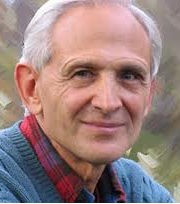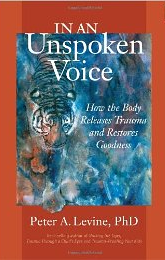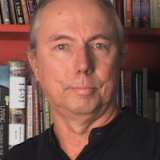Trauma is Not a Life Sentence: Review of Peter Levine’s In An Unspoken Voice
In the detailed, thoroughly researched, and easy-to-read book In An Unspoken Voice: How the Body Releases Trauma and Restores Goodness (North Atlantic Books), Peter A. Levine gives readers a fascinating new perspective on dealing with and healing from stress and trauma.
With decades of experience in psychology and neuroscience, Levine asserts that trauma can be overcome using the body’s inherent ability to heal by listening to the unspoken voice we each have.
This fascinating book covers many topics and aspects of stress and trauma therapy, and includes exercises for self healing.
Experienced Psychotherapist Relates Understanding of Stress
Peter Levine has studied trauma and stress for over thirty five years. With PhDs in medical biophysics and psychology, Levine has worked as a clinical psychotherapist with veterans, rape survivors, Holocaust survivors, accident victims, and chronic pain sufferers.
Levine is the developer of Somatic Experiencing, a revolutionary approach to trauma and its healing using body-awareness methods. This approach was developed in the realization that all human beings have an innate ability to overcome the effects of trauma, no matter how debilitating.
What does this healing do? It restores in people their sense of self-regulation, aliveness, relaxation, and wholeness.
Understanding Trauma
 In An Unspoken Voice: How the Body Releases Trauma and Restores Goodness is a unique and fascinating book that explores how trauma is actually an injury that occurs after a frightening or extremely stressful situation. Levine draws upon his extensive knowledge and research experience with neuroscience when presenting his approach to trauma and the body’s inherent ability to heal: Levine asserts that a sensation-based healing approach using a person’s instinct and facility of reason is an effective methods of healing the physical, emotional, and spiritual consequences of trauma.
In An Unspoken Voice: How the Body Releases Trauma and Restores Goodness is a unique and fascinating book that explores how trauma is actually an injury that occurs after a frightening or extremely stressful situation. Levine draws upon his extensive knowledge and research experience with neuroscience when presenting his approach to trauma and the body’s inherent ability to heal: Levine asserts that a sensation-based healing approach using a person’s instinct and facility of reason is an effective methods of healing the physical, emotional, and spiritual consequences of trauma.
There is a lot of information, personal stories, self healing exercises, and data presented in this comprehensive and detailed book. One of the best lines I came across really struck a chord: “Trauma is a fact of life. It does not, however, have to be a life sentence.” How often does a person experience something traumatic, only to be forever affected? Can you imagine the possibilities that would arise when these individuals are freed from their haunting experiences?
Listening to the Unspoken Voice
I really liked how Levine’s theory acknowledges that emotions and spirituality are two essential features that must not go overlooked in trauma healing. He also notes that trauma is not a mental disease, but an actual physical reaction: like being “scared stiff.”
This is where the other essential part to his theory comes into play. Levine asserts that the restorative healing process starts with the bottom-up perspective of listening to the person’s body speak or unspoken voice before engaging mental, emotional, and spiritual restoration. He notes that while many other therapies use the top-down approach (focusing on emotional healing before physiological), hearing one’s unspoken voice opens up one’s true self.
Must-Read for Healing Practitioners
 Levine explains his position in great detail in the book, but not in a clinical or “fancy-language” way. The average reader will easily enjoy Levine’s In An Unspoken Voice: How the Body Releases Trauma and Restores Goodness, especially anyone who may be struggling or knows someone who is struggling with a traumatic event.
Levine explains his position in great detail in the book, but not in a clinical or “fancy-language” way. The average reader will easily enjoy Levine’s In An Unspoken Voice: How the Body Releases Trauma and Restores Goodness, especially anyone who may be struggling or knows someone who is struggling with a traumatic event.
Anyone working in the holistic health and wellness field, or even a contemporary health care practitioner, will derive great amounts of knowledge from this book that can be applied and practiced within their own healing environments.
For more information, click > In An Unspoken Voice by Peter Levine








